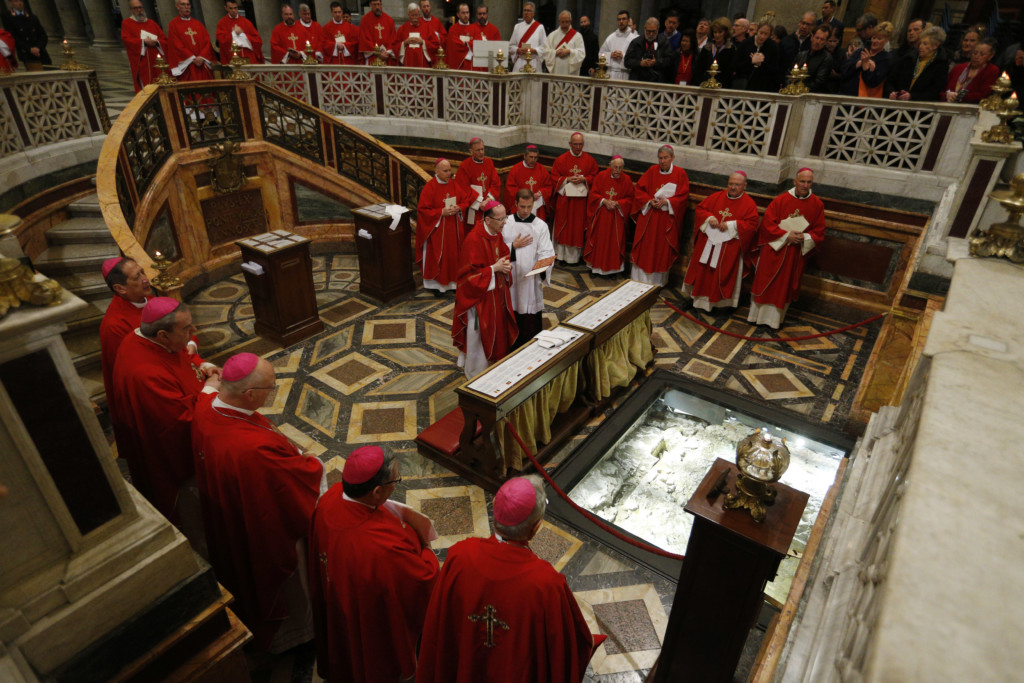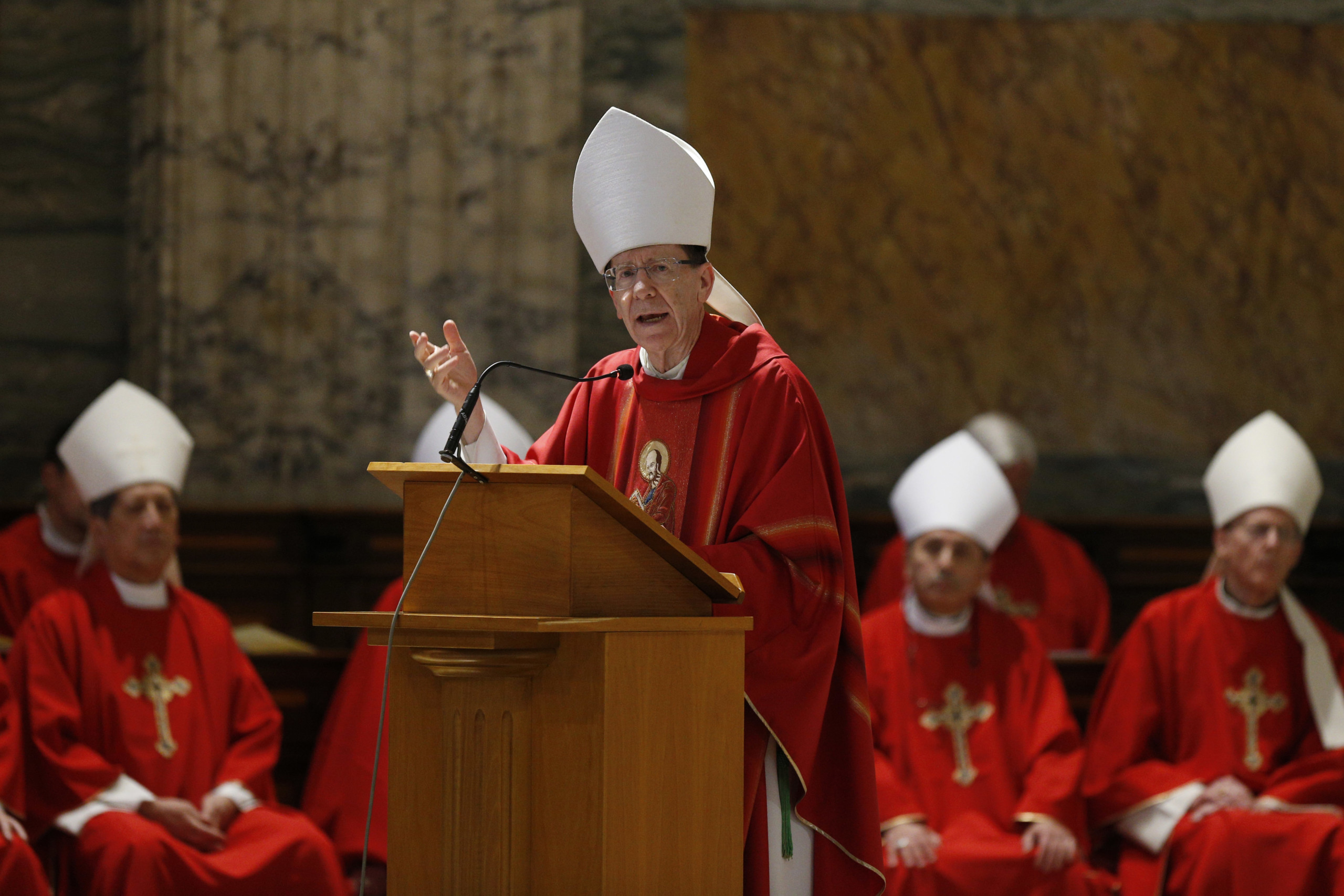Following is the prepared text from Bishop Olmsted’s homily from Feb. 12, 2020, at the tomb of St. Paul in the Basilica of St. Paul Outside the Walls, Rome.
St. Paul wrote to Timothy:
This saying is trustworthy and deserves full acceptance: Christ Jesus came into the world to save sinners. Of these I am the foremost. But for that reason I was mercifully treated, so that in me, as the foremost, Christ Jesus might display all his patience as an example for those who would come to believe in him for everlasting life (1 Tim 1:15-16).
From what we can tell, Saul of Tarsus had never met Jesus before the day he traveled from Jerusalem to Damascus.
Nonetheless, Saul hate Him, or, better said, Saul hated the Jesus he had created in his own mind, and he hated every one of Jesus’ disciples. His “zeal for the law” blinded him to reality.
In his Letter to the Galatians (1:13), Paul wrote, “I persecuted the Church of God beyond measure and tried to destroy it.” Of course, that’s impossible!
However, Saul’s first personal encounter with Jesus totally turned around Saul’s life. That encounter was of such monumental import for the early Church that St. Luke, in the Acts of the Apostles, recounts the encounter in three distinct passages (Luke 9:1-19, 22:1-22, and 26:4-23), and St. Paul speaks of it more than once in his Epistles.
The central focus of each conversion account of Saul of Tarsus is the Lord Jesus. We recall Jesus’ words, “It was not you who chose me; I chose you” (John 15:16).
Jesus chose Saul to be His disciple and then, as Paul said, “to be His witness before all people” (Acts 22:15).
St. John Chrysostom wrote: “The most important thing of all to Paul was that he knew himself to be loved by Christ.”
What do I consider most important?
On the other hand, Chrysostom wrote: “To be separated from that love was, in his eyes, the greatest and most extraordinary of torments; the pain of that loss would alone have been hell and endless, unbearable torture.”
Pope St. John Paul wrote in Ecclesia in America, “Nothing so transforms one’s life as a personal encounter with Jesus. This, our hearts’ both desire and need.”
Conversion usually entails three things: first, a person searching for the truth; second, the truth is discovered and embraced; then, the effects of conversion become evident.
But the conversion of St. Paul seems, at first glance, to have skipped the first of these three stops, namely, the search for truth. After all, Saul of Tarsus was not charging towards Damascus in search of truth but in order to arrest followers of Christ. Only when Christ stopped Saul in his tracks and blinded him with His brilliant light did Saul realize that he was blind in a much deeper sense and that his own grasp on “the truth of things” was actually a grasp of foolish pride. Only then did Saul search for the truth.
But perhaps, Saul’s experience of the first step to conversion is not all that uncommon. Not infrequently, we humans don’t begin to search in earnest for the truth until the house of cards on which we have built our life falls apart or our hard work seems to bear no fruit, leaving us embarrassed and lost.
For that reason, St. Paul’s conversion reminds us to expect great things from God’s mercy when our life seems in tatters, when we are lost, or lonely, or running on empty. As St. Paul wrote, “When we are weak, then we are strong.”
The second step of St. Paul’s conversion story is familiar to us all: that is how the truth became evident to Saul and induced conversion. This step is captured in those words of the Risen Lord (Acts 9:5), “I am Jesus, whom you are persecuting.” Encountering the Living Jesus Christ: this is what turned Saul’s life around. This is all that mattered to him from that day forward. In fact, he writes to the Philippians (3:7ff):
“Whatever gains I had, these I have to consider a loss because of Christ. More than that, I even consider everything as a loss because of the supreme good of knowing Christ Jesus my Lord. For His sake I have accepted the loss of all things and I consider them as so much rubbish, that I may gain Christ, and be found in Him.”
We come on Ad Limina visits to Rome to encounter anew the Lord Jesus and renew our love of him.
Jesus, in that first encounter, says to Saul (Acts 26:13), “Saul, Saul, why are you persecuting me?” Jesus addresses Saul with particular intensity “as He did with our Father in faith Abram, “Abraham, Abraham” (Gen 22:11) and Moses, “Moses, Moses,” (Exodus 3:4) and also the sister of Lazarus and Mary, “Martha, Martha, why? Why are you upset?”
Christ’s call to conversion continues to resound with [the] intensity of His love and mercy. Why? Because we followers of Jesus on earth remain pilgrims, “at once holy” and yet always in need of conversion, purification, always needing to follow the path of penance, prayer and renewal.
St. Ambrose says there are two conversions needed to deepen our communion with Jesus, “water and tears: the water of baptism and tears of repentance.”
Like St. Paul, let us treasure both conversions and trust his words: “Nothing can separate us from the love of Christ.”






